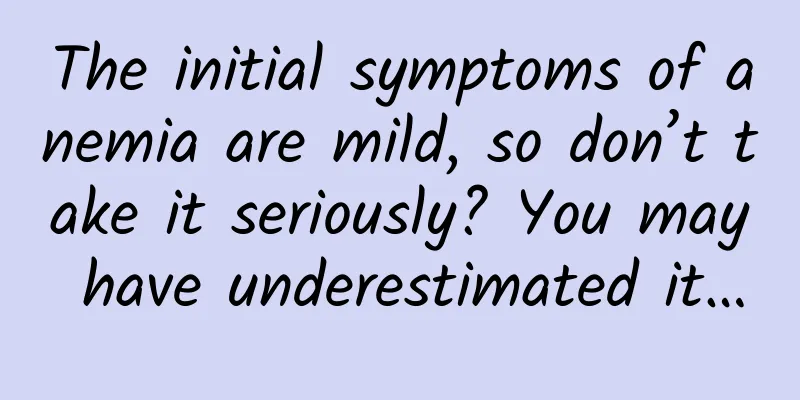The initial symptoms of anemia are mild, so don’t take it seriously? You may have underestimated it…

|
Experts in this article: Zhang Heping, Associate Chief Physician, Nephrology Department, Affiliated Hospital of North Sichuan Medical College, Associate Professor, Doctor of Medicine Hu Houxiang, Chief Physician, Department of Cardiology, Affiliated Hospital of North Sichuan Medical College, Professor, Doctor of Medicine, Supervisor of Doctoral and Master Students In a recent popular variety show "The Heart-Stirring Offer", a medical student received a fainted grandmother in the emergency room. After examination, it was found that the patient's hemoglobin was less than 30g/L, accompanied by a decrease in platelets. The doctors suspected that there was a more serious disease. The grandmother thought it was just a little anemia and it was nothing serious, so she insisted on going home. Many people think that anemia is just a lack of blood in the body, which is no big deal. In fact, anemia can lead to serious consequences. Let's talk about anemia today. What is anemia? Anemia refers to a clinical syndrome caused by a decrease in the volume of peripheral red blood cells, which is lower than the lower limit of normal values, and hemoglobin (Hb) cannot deliver enough oxygen to tissues. Hemoglobin in the human body is mainly located in red blood cells, so anemia is also called hypohemoglobinemia. There are many types of anemia, each with different causes. Anemia can be temporary or long-term, and can range from mild to severe. In most cases, symptoms of long-term chronic anemia are subtle, but if you suspect you have anemia, you should see a doctor as it can be a warning sign of a serious medical condition. What are the symptoms of anemia? The signs and symptoms of anemia vary depending on the cause and severity of the anemia and your individual constitution. At first, anemia is mild and may not cause any symptoms, but as anemia worsens, the following symptoms may occur: Fatigue and tiredness Pale complexion Palpitations, panic Shortness of breath (rapid breathing) Dizziness or lightheadedness, headache Chest pain Cold hands and feet How to determine whether you are anemic? When the above symptoms appear, it only reminds us that we may have anemia, but it cannot be diagnosed as anemia. So how do we judge whether it is really anemia? If it is anemia, how serious is the anemia? When anemia is suspected, a routine blood test is required. According to the diagnostic criteria established by WHO in 1972, anemia is diagnosed when the hemoglobin (Hb) is lower than the following levels in sea level areas (see the table below for details). Once anemia is diagnosed, the severity is determined based on the hemoglobin concentration (see the table below for details). Why do people get anemia? When you know that you are diagnosed with anemia, the first thing you should do is not to rush to correct the anemia, but to find out why our body is anemic, unless the situation is urgent and requires immediate blood transfusion. The causes of anemia are complex and can be roughly divided into the following three categories: Hypoerythropoietic anemia The decrease in red blood cell production mainly depends on three factors: hematopoietic cells, hematopoietic regulation, and hematopoietic raw materials. ① Hematopoietic cells: Red blood cells are mainly produced by hematopoietic stem cells in the bone marrow. Therefore, any factors that affect the function or number of hematopoietic stem cells can lead to anemia, such as aplastic anemia, myelodysplastic syndrome, leukemia, autoimmune diseases, infections, etc., which can reduce the production of red blood cells. Many of these diseases can be detected through bone marrow puncture. ② Hematopoietic regulation: The growth, development, and maturation of hematopoietic stem cells are regulated by many environmental factors, including cell regulation and factor regulation. For example, in patients with chronic renal failure, almost everyone suffers from anemia without treatment. The main reason for this is the lack of erythropoietin (EPO), a hematopoietic factor. Therefore, patients with renal anemia should be treated with erythropoietin. ③ Hematopoietic raw materials: As the name suggests, they are the raw materials needed to produce red blood cells, which mainly include proteins, lipids, vitamins (folic acid, vitamin B12, etc.), trace elements (such as iron, copper), etc. Among them, iron deficiency and iron utilization disorders are the main types of anemia in our daily life. Excessive red blood cell destruction anemia Anemia caused by excessive red blood cell destruction, also known as hemolytic anemia, simply means that red blood cells are destroyed in blood vessels or other organs. For example, blood type incompatibility during blood transfusion causes immune cells to attack our red blood cells, leading to anemia. Other causes include hypersplenism, red blood cell structural dysfunction, such as hereditary spherocytosis, which can cause excessive red blood cell destruction and lead to anemia. Hemorrhagic anemia According to the rate of blood loss, hemorrhagic anemia can be divided into acute and chronic, which mainly include coagulation diseases (such as hemophilia, severe liver disease idiopathic thrombocytopenic purpura, etc.) and non-coagulation diseases (such as trauma, tumors, tuberculosis, peptic ulcer, etc.). How to treat anemia? The treatment of anemia mainly includes "treating the cause" and "treating the symptoms". Treatment of the cause As for whether to supplement iron, vitamins, or regulatory factors after anemia is discovered, or to undergo surgery to remove the spleen or treat the tumor with radiotherapy and chemotherapy, the decision depends on the cause of the anemia. Discovering anemia is only the first step, and finding the cause of anemia is the most important thing! Because anemia is one of the common symptoms of many diseases, ignoring the cause of anemia may delay our diagnosis and treatment of the primary disease, which will have a huge impact. The old lady we mentioned at the beginning of the article, in addition to the decrease in hemoglobin, also had a significant decrease in platelets and a large increase in white blood cells, which actually indicates the possibility of leukemia. Therefore, only by finding out the cause of anemia and actively treating the primary disease can anemia be fundamentally corrected. Symptomatic treatment Compared with causal treatment, symptomatic treatment focuses on reducing the fatal impact of severe hemocytopenia on patients, improving hypoxia, reducing the pain caused by symptoms, and buying time for causal treatment to take effect. Symptomatic treatment mainly includes blood transfusion (whole blood, red blood cells, platelets, etc.) and oral auxiliary medication to correct anemia. The pictures in this article with the "Science Popularization China" watermark are all from the copyright gallery. The pictures are not authorized for reprinting. |
<<: Why does our body need calcium?
>>: What does shark fin taste like? How long can shark fin be kept?
Recommend
What snacks are good for girls?
I believe there is no girl who doesn’t like snack...
What is the chest circumference of 32a?
What is the chest circumference of 32a? We may no...
What foods are good for women's uterus?
As we all know, the female uterus is the source o...
Picture of leucorrhea without pregnancy
The private part is a part that female friends sh...
How is heart bypass surgery performed? How long can the newly constructed blood vessels last?
Author: Wang Huaibin, Chief Physician, Beijing Ho...
Menstrual period meat balls can't be crushed
Generally speaking, it is normal for the total me...
What to eat to replenish energy during childbirth?
Anyone who has given birth knows that childbirth ...
Breast hyperplasia massage method steps
When a woman is breastfeeding, she must prevent t...
Can ultrasound tell if the fallopian tubes are blocked?
The fallopian tubes are the main channels for tra...
Is hot compress effective for hydrosalpinx?
The status of women in the new era has improved a...
This spice is really suitable for eating more in winter! The reason is very interesting
In the cold winter, drinking a bowl of steaming h...
How long does it take for the caesarean section wound to stop hurting?
Before giving birth, many women expressed that th...
Causes of delayed menstruation
Menstruation occurs every month, so women need to...
What to eat to protect the uterus and ovaries? It turns out to be these 5 types of food
As we all know, the uterus and ovaries are import...
What are the causes of pain in the left side of the lower abdomen in women?
In life, many people may hear other women complai...









